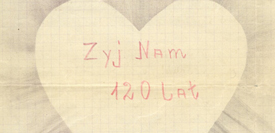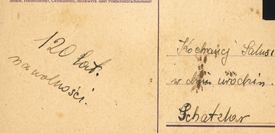Schatzlar
 “March 5th is a happy and a lucky day for us. For today
“March 5th is a happy and a lucky day for us. For today
we are celebrating our dear Sala’s birthday; alas,
still behind barbed wire.”Sala’s last camp was a textile factory in Schatzlar, a ski village on the border of Poland and Czechoslovakia. A few more letters trickled through. Sala’s brother-in-law wrote from the ghetto of Sosnowitz until May 1943. Raizel wrote from the Neusalz labor camp until July 1943. Ala,
working in the Jewish Council office,
wrote her last letter on July 16, 1943, describing the beautiful
weather and being “in the best of spirits.” “We are well and plan to go to the camp,” she concludes. Ala was soon deported to Auschwitz.

All correspondence from the outside world ceased by August 1943. All of the former Schmelt camps had been annexed to Auschwitz or Gross Rosen, or shut down. Sala’s correspondence was reduced to letters from within the labor camp?handmade birthday cards passed from one barracks to the other, marking her three birthdays in Schatzlar. Her well-wishers were women who became sisters to each other. They shared rations, kept each other clean from lice, and, most important, renewed each other’s spirits. Calling Sala “Mrs.
Haubenstock,” and wishing her “120 years of health” (the Jewish traditional birthday greeting), her friends kept her dreams alive.
 “May you never again know suffering/And may you live,
“May you never again know suffering/And may you live,
in good health/For 120 years in freedom…”As the war turned against Germany, Schatzlar no longer received deliveries of raw materials. In the winter of 1944–45, the women were forced to dig trenches while guarded by SS men with guns and dogs. Sala saw Allied planes drop leaflets announcing the impending defeat of the Nazis and Winston Churchill’s demand for “a new world … out of the bloody chaos—a world of peace, of freedom, of laws.”
On the night of May 7, 1945, the women of Schatzlar discovered they were alone. The guards had fled into the forest. The women watched as the Camp Director doused with gasoline the house he shared with his wife and children, then entered and shut the door. Within minutes, the entire house exploded.
Sala and the women welcomed the Russian troops who liberated the
camp on May 8.
View section images